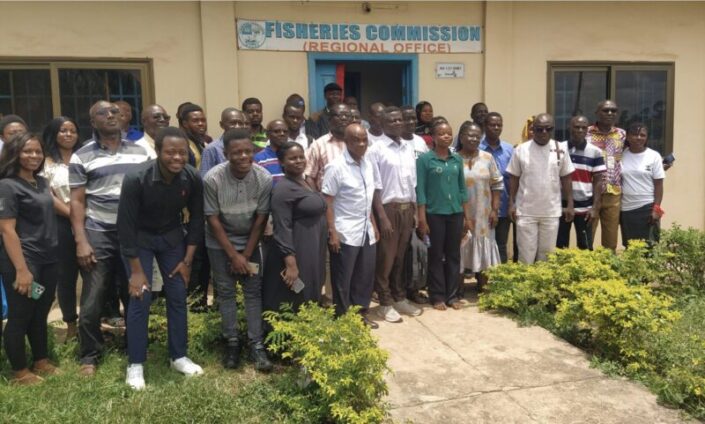Fish farmers have been urged to always contact professionals in aquaculture to draw suitable biosecurity plans for them to implement in their farms.
This would not only help them manage fish mortality and secure their investments but would also contribute to protecting human life since healthy fish would be produced and supplied to the market for consumption.
Mr Theodore K. Owuani, the Ashanti Regional Laboratory Manager of the Fisheries Commission, who made the call, said it was important for people interested in fish farming to have biosecurity in mind, to ensure that they did not record unexpected losses to discourage them.
He was speaking at a biosecurity training workshop for about 58 fish farmers in the Ashanti region.
The training was to help the farmers acquire the requisite skills and knowledge in biosecurity, to help secure their investment by preventing unnecessary fish mortality through the introduction and spread of infections and diseases.
Biosecurity involves management plans and measures put in place to prevent the introduction and spread of infections and diseases among organisms.
Mr Owuani pointed out that though fish mortality should be expected it should not be above 15 per cent of stocked fish, and asked farmers to always contact their zonal officers to introduce them to good hatchery to purchase their brood stock.
This is because, some hatcheries were abusing the use of antibiotics in their farms, and this could cause problems for them, he said.
He indicated that, disease and infection outbreaks depended on three factors which included pathogens, which already existed in the water (environment), the environment and the host (fish).
Mr Owuani, the disease or pathogens in the water manifested when the fish was stressed through overstocking in ponds leading to fish competing for oxygen, poor handling and water parameters.
“When the fishes are stressed, their immune systems break down making them vulnerable to infections and diseases,” he stated.
He named other factors that contributed to infections and disease spread on and between farms as not quarantining new brood stock, poor feed storage, contaminated water and equipment, vectors and others.
Mr Owuani said biosecurity plans were specific to every farm because they had different challenges which needed varied solutions.
He mentioned some biosecurity plans and measures as covering ponds with nets, using clean pathogen-free water sources, sourcing fingerlings from certified hatcheries, and making a pest management programme.
Latest Stories
-
Daughter killed in father’s arson attack over sex denial
1 hour -
NPA Scandal: Four suspects remain in custody after failing to meet bail conditions
2 hours -
NPP to open 2028 flagbearer nominations on July 29
3 hours -
Sam George to open Pan-African AI Summit 2025
3 hours -
NDC opens nominations for Akwatia parliamentary primaries on July 28
4 hours -
Guinness Ghana DJ Awards opened new doors for my career – DJ Pho
4 hours -
Mohammed Sukparu commits to advancing Ghana’s Artificial Intelligence agenda
5 hours -
‘What is coding?’ – Question raises eyebrows during Deputy Communication Minister-nominee’s hearing
5 hours -
WAFCON 2024: Ghana’s Black Queens claim third-place after penalty win over South Africa
5 hours -
Ghana celebrates 100-year-old WWII veteran Joseph Ashitey Hammond
6 hours -
Measures announced in Mid-Year Budget Review fully in line with programme objectives – IMF
6 hours -
This Saturday on Newsfile: AG drops charges in uniBank trial, Aud-General’s report, and Mid-Year Budget Review
6 hours -
Parliament passes Road Maintenance Trust Fund Bill
7 hours -
Heavy security deployed at Manhyia Palace following Asawase shootings
7 hours -
Kumawu MP Ernest Anim urges Parliament to act on crisis in Ghana’s prisons
7 hours

